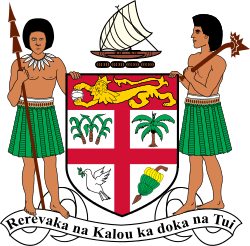1914 Fijian general election
General elections were held in Fiji between 19 May and 20 June 1914.[1]
 |
|---|
| This article is part of a series on the politics and government of Fiji |
|
Legislative
|
|
Judiciary
|
|
Electoral system
The Legislative Council included seven elected Europeans who were elected from six constituencies created as a result of amendments to the constitution made on 31 January 1914, which increased the number of elected Europeans from six to seven and the number of constituencies from five to six. The new constituencies were Eastern, Northern, Southern, Suva, Vanua Levu & Taveuni and Western.[2]
| Constituency | Geographical area | Election date |
|---|---|---|
| Eastern | Lau Province, Lomaiviti Province, Levuka municipality | 19 May[1] |
| Northern | Ba District, Colo North Province, Ra Province | 19 June |
| Southern | Colo East Province, Kadavu Province, Naitasiri Province, Namosi Province, Rewa Province (except Levuka), Serua Province, Tailevu Province | 19 May |
| Suva | Suva Municipality | 20 June |
| Vanua Levu and Taveuni | Bua Province, Cakaudrove Province, Macuata Province | 19 June |
| Western | Colo West Province, Lautoka District, Nadi District, Nadroga Province | 19 June |
Results
| Constituency | Candidate | Votes | % | Notes |
|---|---|---|---|---|
| Eastern | John Maynard Hedstrom | Unopposed | Re-elected | |
| Northern | Henry Lamb Kennedy | 53 | 58.2 | Elected |
| L. Davidson | 38 | 41.8 | ||
| Southern | Robert Crompton | Unopposed | Elected | |
| Suva | Henry Milne Scott | 221 | 41.9 | Re-elected |
| Henry Marks | 210 | 39.8 | Re-elected | |
| C.A. Brough | 96 | 18.2 | ||
| Vanua Levu & Taveuni | Edward Duncan | 99 | 79.2 | Elected |
| James McConnell | 26 | 20.8 | ||
| Western | Charles Wimbledon Thomas | 89 | 66.4 | Re-elected |
| J.C. Doyle | 45 | 33.6 | ||
| Source: Ali | ||||
Appointed members
| Position | Member |
|---|---|
| Governor (President) | Ernest Bickham Sweet-Escott |
| Agent-General of Immigration | Sydney Frederick Smith |
| Attorney General | Alfred Karney Young |
| Chief Medical Officer | George Lynch |
| Colonial Postmaster | Herbert Paul St. Julian |
| Colonial Secretary | Eyre Hutson |
| Commissioner of Lands | Dyson Blair |
| Commissioner of Works | William Akerman Miller |
| Inspector General of Constabulary | Islay McOwan |
| Native Commissioner | Kenneth Allardyce |
| Receiver General | Richard Sims Donkin Rankine |
| Superintendent of Agriculture | Charles Henry Knowles |
| Fijian member | Joni Madraiwiwi I |
| Fijian member | Joni Antonio Rabici |
| Source: Fiji Blue Book[1] | |
Aftermath
Further changes were made to the constitution in 1916, increasing the number of nominated members from 10 to 12; eleven were civil servants and the other had to be a British subject not holding public office.[3][4] Badri Maharaj was chosen as the twelfth nominated member, becoming the first Indo-Fijian member of the Legislative Council.[5]
References
- Fiji Blue Book for the Year 1914, p85
- 1914 Fiji Legislative Council elections Fiji Elections
- 1917 Legislative Council Election Fiji Elections Archive
- Fiji, The Stationery Office, pxli
- Brij V. Lal (1992) Broken Waves: A History of the Fiji Islands in the Twentieth Century, University of Hawaii Press, p38